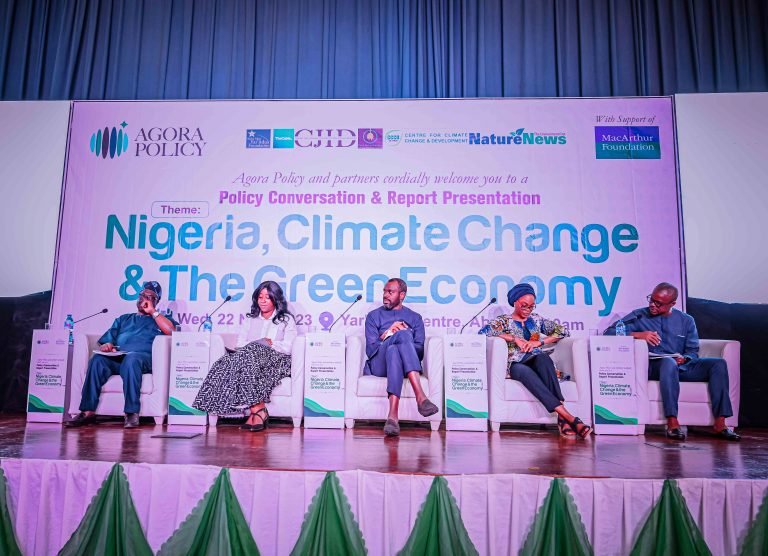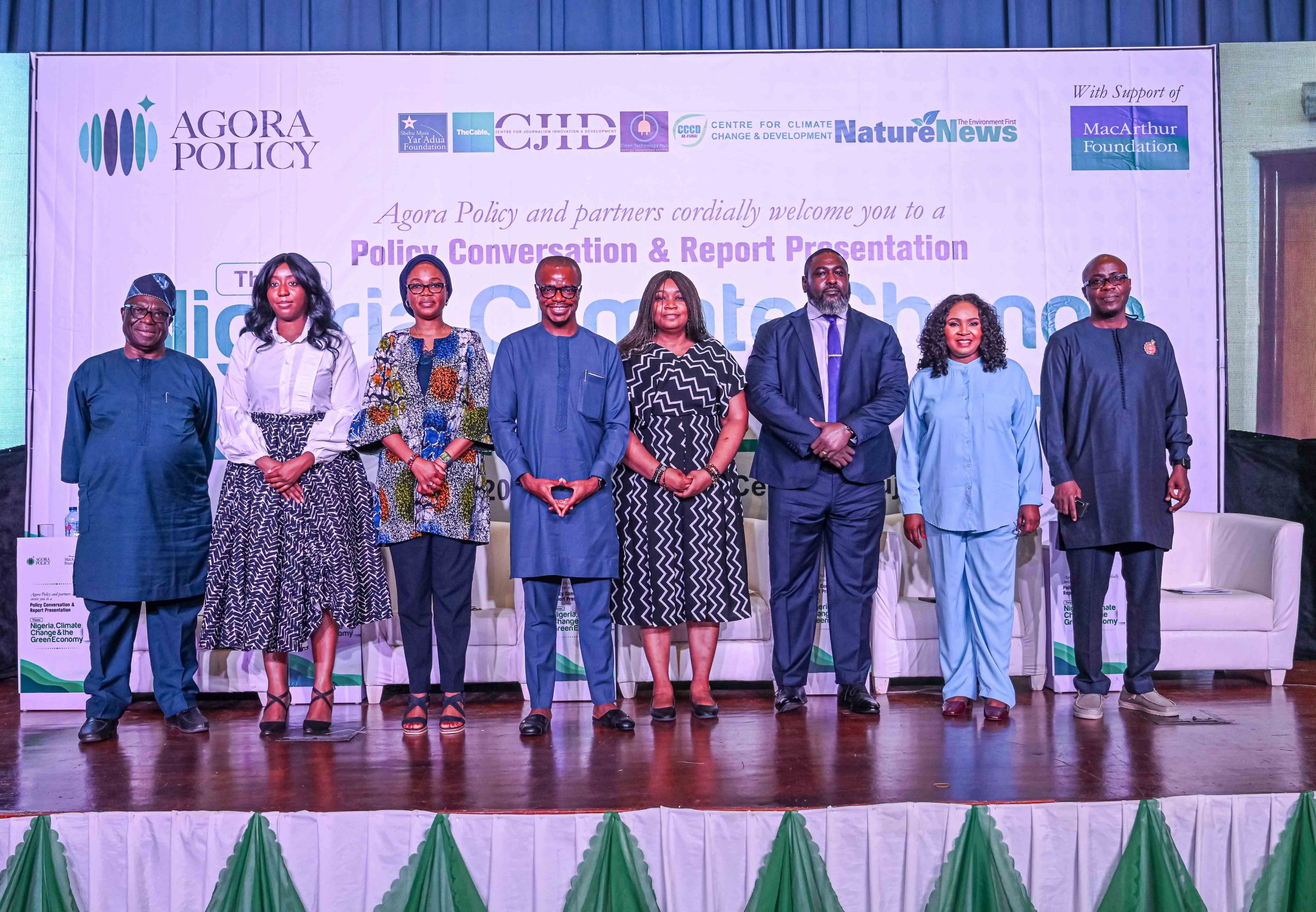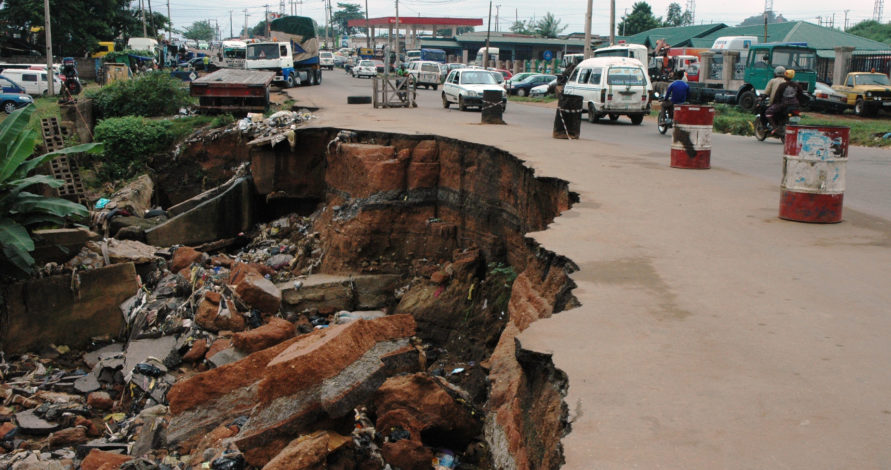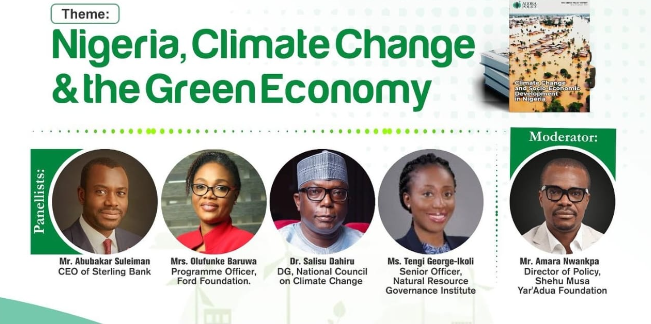By Ifetayo Idowu and Faridha Salihu-Lukman
Last Wednesday, 22 November 2023, Agora Policy and partners convened a policy conversation in Abuja to explore the intersection between climate change, energy transition, and the green economy in Nigeria. The event also featured the public presentation of Agora Policy’s latest report, entitled “Climate Change and Social-Economic Development in Nigeria,” produced with the support of MacArthur Foundation, also the sponsor of the policy conversation.
From the remarks, goodwill messages, panel discussion, special interventions and the question-and-answer session, many ideas were offered and discussed about the state of climate change awareness and interventions in Nigeria and what the country needs to do to minimise the risks and maximise the opportunities of the global transition to cleaner energy.
Below are five of the key insights from the deliberation.
-
Denial and defiance define national attitude to climate change in Nigeria
There was a clear consensus among the speakers that evidence abounds that climate change negatively impacts Nigeria through different channels and that it increases Nigeria’s exposure to hunger, poverty, diseases, and conflicts. There was also an agreement that the toll of climate change on the country will get worse if urgent action is not taken. However, that sense of urgency is hardly seen even within official circles in the country. Mr. Waziri Adio, the Executive Director of Agora Policy, said the national attitude on climate change “oscillates between denial and indifference.” According to Mr. Tayo Aduloju, the CEO-designate of the Nigeria Economic Summit Group (NESG), there is another dimension: defiance. “This defiance comes from perspective that climate change is not Africa’s fault, not Nigeria’s fault. Therefore, ignore it.”There was an agreement that these attitudes are not useful and need to change for the country to adequately adapt to climatic changes and appropriately position itself to benefit from energy transition.
-
Climate change is a major, not marginal, challenge for Nigeria
In his presentation, Professor Chukwumerije Okereke emphasized that it is wrong to see climate change only from the lens of the environment. He submitted that it is more useful to see climate change as the key development challenge of the country. He stated: “Climate change is not a marginal environmental problem out there. But it is a major, perhaps the defining, socio-economic, geopolitical, demographic challenge facing Nigeria today.” Other speakers echoed the same sentiment, calling for more urgent and bolder actions, and the need to mainstream climate change into national development plans.
-
The poor and the vulnerable could be further disadvantaged
Various speakers argued that climate change imposes a disproportionate burden on the poor, the vulnerable and the marginalised and could further deepen inequality in terms of energy access and income in the country. Dr. Kole Shettima of MacArthur Foundation, Mrs. Funke Baruwa of Ford Foundation and Ms. Tengi George-Ikoli all made this point in various ways, and they all urged that climate policies be designed and implemented in an inclusive and collaborative manner, with special attention paid to ensuring that policies and actions bridge and not widen inequality in society.
-
Showing benefits critical to optimising gains of the green economy
Climate change is not all bad news as the transition to cleaner energy offers Nigeria and others opportunities for improving energy access, creating jobs and increasing economic growth. According to the World Bank Country Director, Dr. Shubham Chaudhuri, Nigeria needs to strike a delicate but necessary balance between improving energy access and aligning with the shift towards a low-carbon world. For Mr. Abubakar Suleiman, it is important to demonstrate to various stakeholders that embracing renewable energy will help to save cost, increase profits, create job and grow the economy. “One language that every understands is their bottom-line,” he said, emphasising the need for government to stimulate demand for renewables and to invest in the alternative energy eco-system so that Nigeria can benefit from every part of the value-chain. For example, he argued, Nigeria should not just be interested in using solar panels but also in making them too. Ms. George-Ikoli reinforced this point by advocating that Nigeria should be keen on processing its green minerals, rather than just exporting them raw.
-
Simplification should be an article of faith
Awareness about climate change is very low in Nigeria. Some of the speakers reckon that this is because the language adopted in communicating the issue is too technical for most people. There was a call to simplify the language and frame climate change in a way many Nigerians can understand and relate with. “We need to find a different nomenclature for the world climate change maybe then it will make more sense to policymakers and to the ordinary people,” said Mrs. Baruwa. Dr. Shettima put it this way: “When you talk to Nigerians about climate change, most people don’t know what it is. But when you talk to Nigerians about flooding, they know what flooding is. When you talk to Nigerians about drought, they know what that means.” Having a clear understanding of the meaning, impacts and opportunities of climate change will be critical to achieving an all-of-society and a coordinated approach that most speakers agreed is needed to move the needle on climate action in Nigeria.




